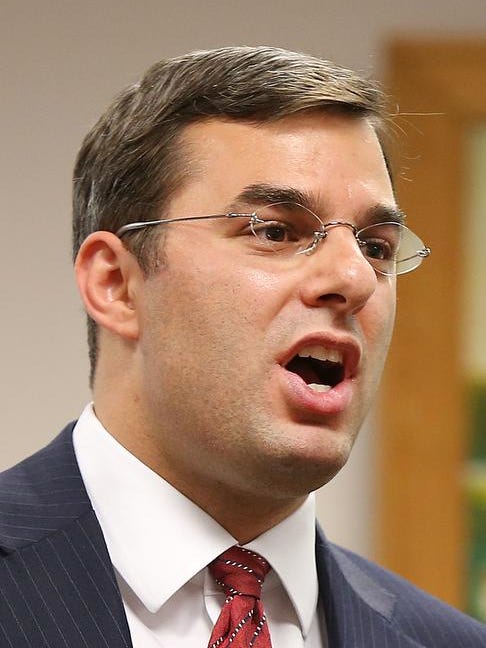Amash's presidential decision could spell trouble for Trump in Michigan
 Melissa Nann Burke
Melissa Nann Burke
Washington — If Republican U.S. Rep. Justin Amash decides to run for president as a Libertarian, his candidacy has the potential to upend President Donald Trump's re-election chances in Michigan.
Libertarian Party leaders predict Amash could win the nomination should he pursue it, and analysts say the fifth-term congressman could draw Republican votes from Trump in upper Midwest battleground states.
A Trump critic from the Grand Rapids area, Amash has flirted with suggestions that he make a run for the White House in 2020 when asked about the idea.
The 38-year-old lawmaker says he has not ruled out a run on the Libertarian ticket but also claims he isn't actively considering it.
"'Considering' is too strong a word," Amash said in an interview at his office.
"There's no shortage of possibilities, and I just don't want to rule things out. I think about them and make decisions according to what I think will make a difference.
"And, you know, you also only run for things if you feel like there's a good possibility of winning," he added. "So you have to weigh all these factors."
Amash has developed a unique libertarian brand in Congress and is "so entrenched" in his district it would present "pretty significant challenges" to the Trump re-election campaign in Michigan if Amash were the Libertarian nominee, pollster Richard Czuba said.
"Tens of thousands of people in West Michigan have voted for Justin Amash. They don't just walk away from him suddenly," said Czuba of the Glengariff Group in Lansing.
"That's not to say he'd get the same number of votes by any stretch, but it wouldn't take a lot of votes to siphon away if Michigan were a close race. As we saw in 2016, it doesn’t take a lot of votes from a third party to tip the scales."
Calculating an Amash effect
Trump won Michigan in 2016 by 10,704 votes. That year, Libertarian candidate Gary Johnson received over 172,000 votes, or 3.6 percent of the vote in Michigan. Green Party candidate Jill Stein captured 51,463 votes, or a little over 1%.
The calculus is complicated, said Larry Sabato at the University of Virginia Center for Politics. Libertarians generally take more votes from Republicans than Democrats but also generate votes that wouldn’t otherwise be cast for the two major parties.
"Amash’s entry wouldn’t be welcomed by the Trump campaign, but it is also true that he’ll only matter in the Electoral College if this is a very close election, with a fair number of states looking like Michigan did in 2016 — that is, 10,000 votes of difference," Sabato said.
Amash, who never endorsed Trump in 2016, dismissed the suggestion that his candidacy could potentially to deny Trump another Michigan victory.
"Who knows? Maybe he'd deny me Michigan. I don't know," Amash said of Trump.
"That kind of perception of third-party candidates and independent candidates is a problem," he added.
"One of the reasons it's persisted as a problem is we haven't had strong candidates typically running third-party campaigns or independent campaigns. I really think if you have a strong candidate, that person can far exceed expectations."
Amash has long eschewed partisan loyalties, casting votes based on his principles and conscience. The GOP could not stop him should he decide to run.
"It's naturally going to be semi-problematic but, you know, the Republican primary base is still extremely favorable for the president," said Paul Cordes, former executive director of the Kent County GOP.
"I personally don't see it having a huge impact, as much as any Libertarian candidate would."
Indeed, Amash's willingness to buck Trump could turn off the president's base or attract a primary challenger to his U.S. House race, said Cordes, now political director at Sterling Corp., a GOP consulting firm in Lansing.
"Justin was kind of the anti-establishment candidate before the whole Trump revolution within the Republican Party, but a lot of those supporters have since gravitated toward the president," he said.
Ronna Romney McDaniel, chair of the Republican National Committee, declined to speculate on whether Trump would back an Amash primary challenger.
"I actually never talked to the president about Justin Amash, and he’s never raised any desire to get involved in that race," McDaniel said.
Draft Amash movement
Several Libertarian Party leaders said Amash has a shot at the nomination as the most prominent libertarian voice in Congress.
"It's definitely a path that seems like it's open to him," said Nicholas Sarwark, chairman of the Libertarian National Committee.
"There is excitement. There is an organized effort by people within the party to draft him, to encourage him to jump over and get into the race. I haven't really seen that kind of heavy draft effort since probably people tried to get Ron Paul to run as a Libertarian again in '08," Sarwark added.
"At this point, he’s the one who’s generating the most buzz. But as I remind myself every time I open my Twitter feed, we're still a ways out from the actual calendar year 2020, so I don't get too excited this early about anything."
Sarwark and others acknowledged some delegates would resist a GOP-turned-Libertarian candidate.

However, there's precedent for such nominees, including Johnson in 2018 (a former Republican governor of New Mexico) and Bob Barr in 2008 and Ron Paul in 1988 (both former GOP congressmen).
"At the same time, I know from experience when you have someone who has been a Republican or Democratic elected official switch parties and try to seek our nomination, it’s no slam dunk," said Bill Hall, chair of the Libertarian Party of Michigan and former general counsel for the Libertarian National Committee.
"They are going to have to convince those delegates at the national convention who are very independent-minded that they truly support libertarian principles."
Hall noted the party ran challengers against Amash in 2010 and 2012 but when Libertarian candidates for Congress emerged in 2014 and '16, they were blocked by Amash supporters, including Hall, at the state convention.
"There is substantial support for what Justin is doing within the Libertarian Party," Hall said.
"I really do believe he's focused on what's the best way to deliver the freedom message and would running for president be better than staying where I am, plugging along in Congress?"
Bill Gelineau, the 2018 Libertarian candidate for Michigan governor, contends Amash couldn't get the nomination because not enough of his views line up with the Libertarian platform.
Gelineau, who unsuccessfully challenged Amash in 2012, says the congressman hasn't done enough on criminal justice reform, for example. He also opposes abortion, while the Libertarian platform says government should stay out of the matter.
"Justin has a pretty good sense of putting his finger in the air. He can talk about it, but I don’t think he’d do it, and he’d lose if he did. And that would destroy his brand," Gelineau said. "I think it’s a big bluff."
Minority voice in GOP
The Libertarian nominee should most importantly be libertarian, Amash said, and should be able to attract supporters from the two major parties without compromising his or her principles.
"If you can get people to think about libertarianism as the philosophy of America — that it is just an appreciation for American principles of individualism and liberty and freedom — I think it's very accessible to a lot of people," he said.
Amash is in the minority party in Congress for the first time but, "I've always been a minority of sorts here."
Amash has always been a Republican, he said, but willing to take positions counter to the party when he disagrees with leadership.
"There's obviously a real sense in which I am the most independent Republican in Congress," he said.
Under Trump, the GOP has focused more on nationalism, trade protectionism and cultural issues, and less on what Amash wants to see — fiscal conservatism and the general protection of rights.
Several of his colleagues in the conservative House Freedom Caucus have become Trump's biggest defenders on Capitol Hill. Amash said he's stopped going to the caucus meetings regularly, though he still considers its members some of his best friends.
"The Tea Party is largely gone. There are not that many members of Congress who care about limited government, economic freedom and the individual liberty — at least not as a combination like that," he said.
"Maybe that's why I stand out a little more now, because I do care about those things. I ran for Congress to help move us back in that direction — more a direction of liberty."
David Boaz, executive vice president at the libertarian Cato Institute, suspects Amash is weighing a run for president because he's frustrated by his back-bencher status and how his Freedom Caucus friends "seem less interested in freedom in the Trump years."
"All of that is making him feel more isolated, and he's finding it more of a challenge to be effective in the current House of Representatives," Boaz said.
"That's got him thinking about whether this is he wants to be doing. He's still very young. He could go back and have legal career or run for higher office in Michigan — which is probably more challenging — or he could probably get the Libertarian nomination."
Under Michigan law, running for president would mean Amash giving up his seat in Congress. State law prohibits a federal candidate from filing to run for more than one office in the same election, according to the Secretary of State's office.
The odds are stacked against third-party candidates. And some within the Libertarian Party will clamor for a candidate who proposes more radical ideas, Boaz said.
"If he didn't want to do it, it would be easy to shut down the conversation. He's not done that," Boaz said.
"I'm sure he's genuinely thinking out loud, and one thing he wants to see is what kind of reaction he gets from in his district and among libertarians generally."
mburke@detroitnews.com
Staff Writer Jonathan Oosting contributed.
Justin Amash
Home: Cascade Township, suburb of Grand Rapids
Age: 38
Professional experience: Lawyer at business law firm Varnum LLP and then he worked for the family’s hand tool business, Michigan Industrial Tools — now called Tekton Inc.
Political experience: Michigan House member, 2009-2010; Michigan U.S House District 3, 2011-present